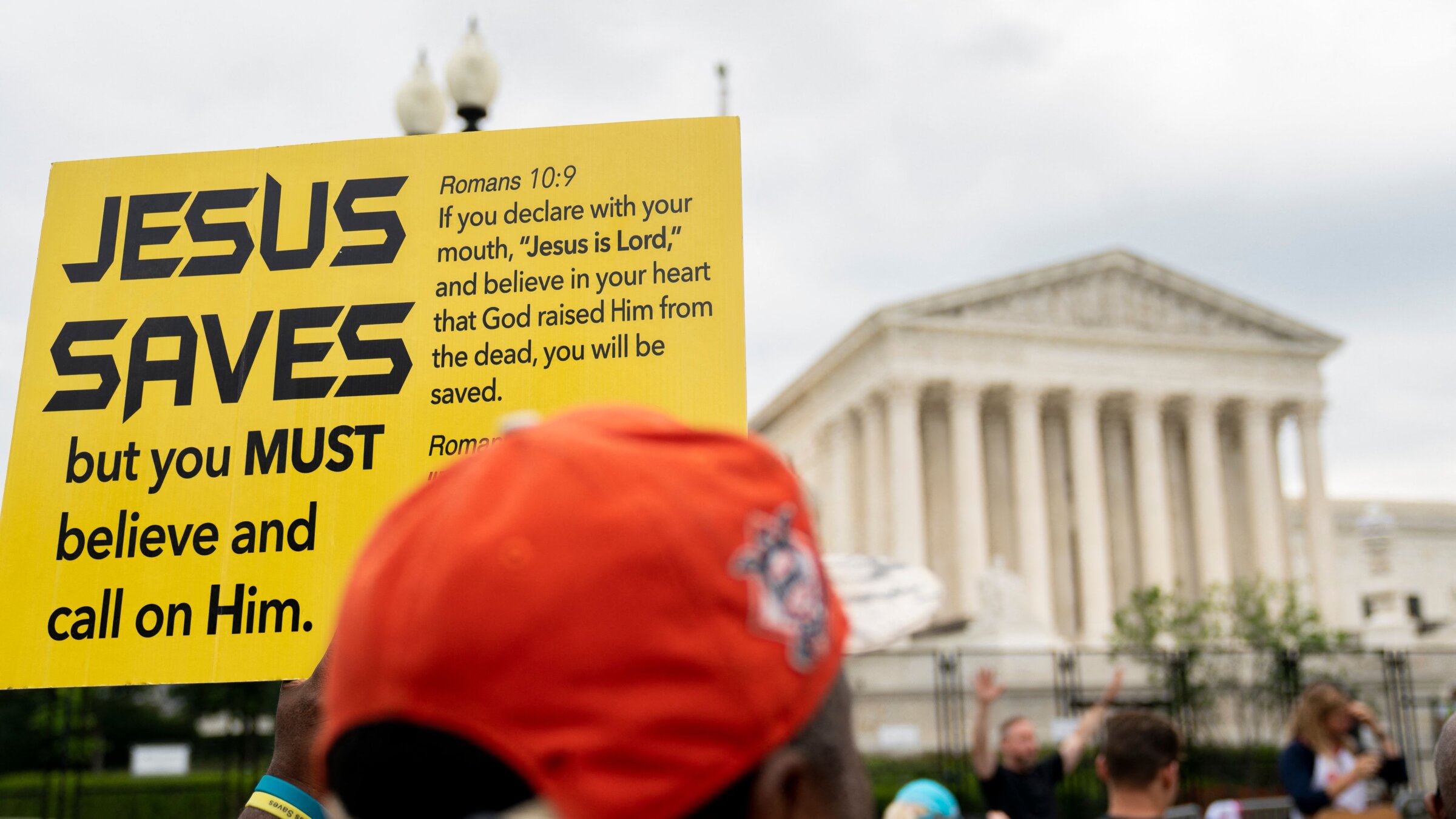Trump wants prayer in schools. The Bible tells us how dangerous that is.
Monotheistic societies have spread intolerance and violence throughout the ages

A person holds a Jesus Saves sign outside the U.S. Supreme Court on June 27, 2022. Photo by Stefani Reynolds/AFP via Getty Images
President-elect Donald Trump’s recent expression of support for instituting prayer in schools across the country is clearly alarming. Floating the very idea constitutes a blatant threat to the separation of church and state, which has been a vital principle of this country since its founding. It would take us back to benighted historical eras of the past.
It may be that Trump was simply preaching to the choir of his evangelical supporters, not making a serious proposal of policy. And were such an initiative enacted, it would of course quickly be mired in the courts. But the threat is nonetheless serious — as the context in which the Hebrew Bible was written itself shows us.
In the ancient Near East, the setting from which the Hebrew Bible emerged, it was a common assumption that anyone living in a particular kingdom would adhere to the cult of that kingdom’s principal deity. If you lived in Moab, you worshipped Cemosh. If you lived in the kingdom of Judah, you worshipped Yahweh.
When Ruth, in the Bible, vows to Naomi that she will follow her steadfastly, and that Naomi’s god will be her god, she is not contemplating “conversion,” as the rabbis later imagined. She is plainly assuming that should she end up in Bethlehem, with Naomi, she would worship the chief deity of that place and that country. This general practice follows the logic of polytheism: If every country had its own dominant god, formal devotion to that god was a natural part of belonging to that country.
The advent of monotheism gave a new twist to this practice. If the god to whom any given region was devoted was thought of as the exclusive God of all the world, alternatives could not be countenanced. Polytheism, by contrast, had a certain built-in tolerance.
There are countless examples, through history, of the intolerance fostered by monotheism. Catholics, repeatedly held in suspicion after the reign of England’s King Henry VIII, were subject to an array of legal restrictions, could not serve in Parliament until 1829, and were freed of all restrictions only in the 20th century. Jews, who were admitted back into England by Oliver Cromwell in 1656 after having been expelled in 1290, long remained a tolerated minority without full legal rights. It took until 1846 to rescind a law that required them to wear special garments.
These kinds of practices suggest the sinister horizon evoked by Trump and his followers in their efforts to “restore” the United States as a Christian nation — the institution of prayer in schools being an obvious part of that aspiration.
The first question the idea raises: Who would lead those prayers? Even in the deepest-dyed red states, not all teachers are Christians, and certainly not all Christians of the same stripe. Their numbers include liberal Protestants, ardent fundamentalists, Jews, Muslims, and staunchly secular people — just for a start.
A clue to this problem is provided by the evangelicals themselves. When the state of Oklahoma sought to mandate a Bible and Bible instruction in every classroom, there were vehement objections from the evangelical community. The reason was straightforward: They did not trust schoolteachers to provide the kind of Bible instruction of which they could approve, and they argued that the proper setting for teaching the Bible was the church. The objections to teaching the Bible in the classroom are certainly also applicable to prayer in the classroom.
That would hold particularly true if such prayers were cautiously couched in inclusive, undogmatic language. Devout Christians would surely protest that this was a distortion of authentic prayer — a risk for Trump, who does not want to lose support from his Christian base.
But the gravest problem, of course, of this mingling of the devotional with the educational is its likely effect on students who do not belong to the Christian majority. If we are to begin turning into a more decisively Christian nation — something closer to a monotheist, not polytheist, one — will non-Christian students be coerced into feeling they are somehow not fully American?
A good many decades ago, when I was growing up in Albany, New York, we regularly sang Christmas carols in class during the weeks leading up to Dec. 25. The music of many of the carols was beautiful, and I think I enjoyed it. The words were something else. As a 10-year-old, I was obviously giving no thought to theology, but when I came to lines like “Remember Christ our Savior was born on Christmas day,” I balked. I knew that Christ was their savior and not mine, and like many of the Jewish kids in the class, I mouthed the words rather than sang them.
If religion is to become part of public education, it is bound to make many children feel they have to behave like latter-day Marranos, going through the motions but secretly adhering to another faith, or no faith at all, in the United Christian States of America. This is an abhorrent prospect, one that should be resisted legally, politically and morally. It is unfortunately one of many realms in which American democracy now could be compromised.















